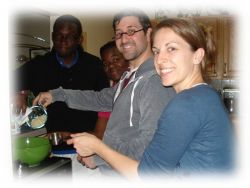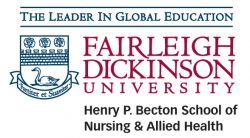Passing It On: NCIN Scholars Community Service in Action
With all of the demands students face in an accelerated degree program—classes, clinicals, meetings with mentors and more, all in a compressed time frame—a community service component may seem like too much of an extraneous burden to throw into the mix.
Far from it, says Elizabeth Parietti, EdD, CNM, APN-C, New Careers in Nursing (NCIN) program liaison at Fairleigh Dickinson University in Teaneck, N.J.: “I think it’s a very important part of our success.”
NCIN doesn’t require grantees to include community service, but it is recommended as a way for scholars to cultivate the kind of commitment and compassion it takes to flourish in their new profession.
“I couldn’t advocate it more,” says Parietti. “I think it’s one of the reasons we haven’t had any dropouts from the program. They form a cohort, and there’s a sense of cohesiveness, and they support one another.”
“It’s a lot of work,” says Danielle Reade, an NCIN scholar who will soon wrap up her one-year accelerated program at Fairleigh Dickinson, “but it helps you break away from studying, and we find a lot of enjoyment in it.”
Reade and her fellow scholars are required to participate in one community service activity per month, and their efforts have included leading an arts and crafts workshop at an assisted living facilitiy (Bright Side Manor), cooking and serving a meal at a residential AIDS program, recruiting participants for the American Cancer Society’s Relay for Life, doing hands-on work for Habitat for Humanity, and collecting donations for Shelter Our Sisters, a nonprofit agency that helps victims of domestic violence.
But once a month hasn’t always been enough, Reade says. If there’s another intriguing opportunity in the same time frame, why pass it up?
“We’re excited about community service, and we’re all looking for different things to do. So when an option comes up, we just take it.”
“I can’t believe the things they accomplish on such tight schedules,” says Parietti, “but they’re doing it, and they’re having fun doing it. At first we thought it would be impossible to find time to send them out into the community, but it’s worked out wonderfully.”
“They meet people where they are, in the community or in their homes, and it gives them a fresh perspective,” Parietti adds, “and it’s a perspective that we think is very important in their socialization in nursing.
“One of things that has happened that we weren’t expecting is that the community has really gotten to know the students, and they want more students like them to come out and do things for them.”
More Examples of NCIN GRANTEES AND THEIR COMMUNITY SERVICE APPROACH
Azusa Pacific University
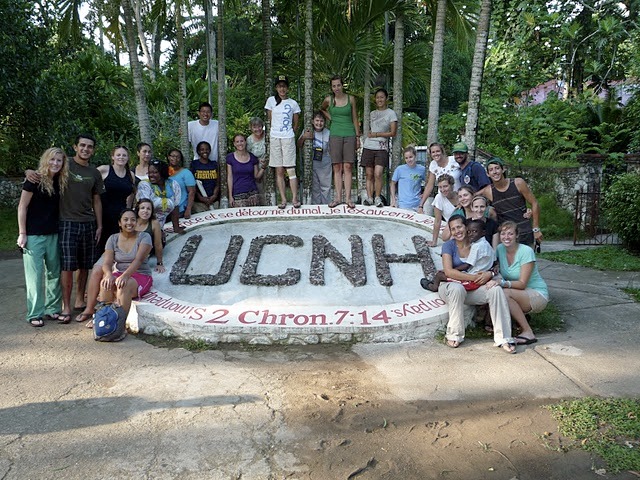
The community service component of Azusa Pacific University’s accelerated program is a natural fit for an institution that prides itself as being “built on Four Cornerstones: Christ, Scholarship, Community and Service.”
At the main campus in Azusa, Calif., and at regional centers in San Diego and the Inland Empire, NCIN scholars and other accelerated students regularly participate in a variety of community service projects, including health fairs at churches and community agencies, food and clothing drives for shelters, immunization and vaccination campaigns, asthma treatment programs for schoolchildren, and medical mission trips to Mexico and Haiti during college breaks.
Students have also traveled abroad to support recovery efforts in Japan after 2011’s devastating earthquake and tsunami. And they are a key volunteer resource for two college-community initiatives: the Neighborhood Wellness Center, a joint effort with the city of Azusa to promote healthy living through free seminars, referrals, screenings and assessments; and a health services partnership with the East San Gabriel Valley Coalition for the Homeless.
Nebraska Methodist College
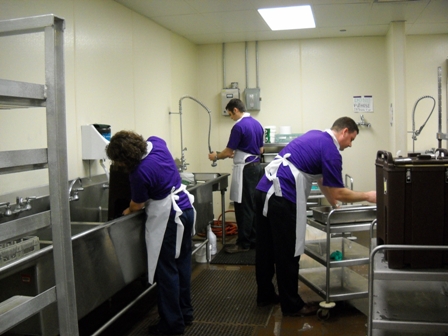
The accelerated program at Nebraska Methodist College in Omaha includes service learning as a mainstay throughout its 15-month duration.
With a special focus on underserved populations, service learning activities have included working with Lutheran Family Services to support refugees and immigrants by organizing a storage warehouse and setting up apartments, working with the Somali Bantu Center to conduct home visits and teach cleaning methods to new immigrants, and providing blood pressure screenings at a local mall.
Students have also worked with Latinas in Action to provide blood pressure and glucose screenings; worked with clients in the Women, Infants and Children (WIC) Program; participated in World Refugee Day; provided flu shots in the Mobile Diabetes Center; and conducted health outreach for elementary school students.
The University of Wyoming
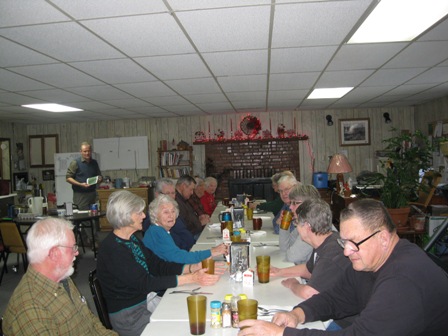
The Bachelors Reach for Accelerated Nursing Degree (BRAND) Program at the University of Wyoming in Laramie includes service learning activities in several courses each semester.
For their aging course, students establish a relationship with an older community resident and start a guided dialogue about the aging process. Students also provide a needs assessment and an educational offering to a senior center or assisted living facility. An NCIN scholar with a PhD in French once combined his love of cooking with his previous degree and led a French cooking class at a senior center for farmers and ranchers.
BRAND students also spend a week living, working and studying at the Wyoming state psychiatric hospital, as well as a week at the Wyoming Life Resource Center, a state institution for the mentally disabled.
BRAND students work with public health departments throughout the state to provide flu immunization clinics, and BRAND students are also collecting donated items for a medical clinic in Honduras that’s being established by the nursing school, medical family practice residents, the engineering college and local firemen. Some students will also join a 10-day “spring brigade” at the clinic site. The entire state of Wyoming is involved with raising BRAND nursing students and the BRAND students pay it forward with their community service.
There are many approaches that can be taken when deciding how to implement a community service component. While it may seem as if it adds an extra layer of work, the success of these and other NCIN grantees prove that the effort reaps rewards that are significantly greater than the resources invested.
Check out the PowerPoint presentation from Fairleigh Dickinson University students performing their community service work!
